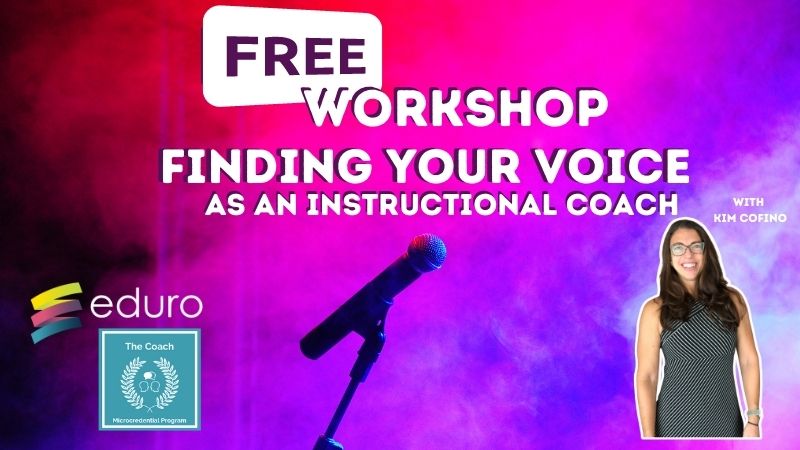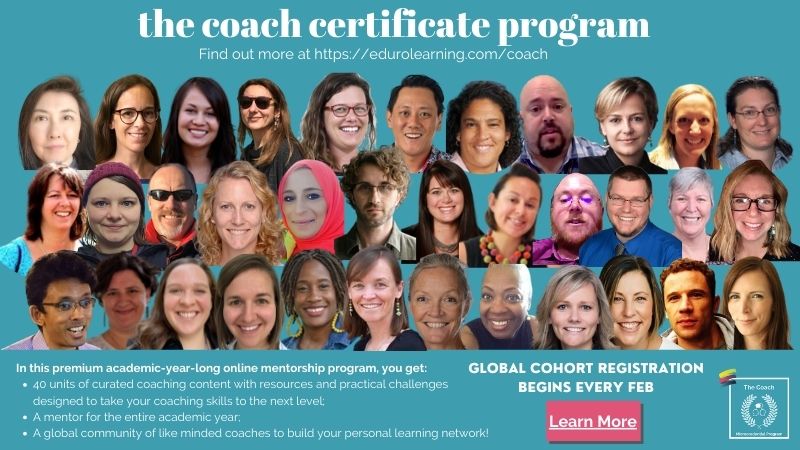We want to give you a peek inside our Coach Certificate & Mentorship Program. Coaches taking part in this academic-year-long journey have graciously given us permission to post some of their learning and reflections from the private coursework they are undertaking during this program. Where possible, we have shared the course and the action task to give context for the guest post.
The Topic: Coaching Conversations
The Task: Which of the coaching approaches is the most challenging for you?
Which of the coaching approaches is the most challenging for you? Why?
I think the most challenging coaching approach is the actual coaching, not the consulting, not the collaborating. I think this is because it is the newest to me. Although I have been working as a coach for many years and have taken many kinds of coaching PDs. I’m more comfortable as a consultant and collaborator, not a coach. It’s the years of not being a coach that makes it hard to change. In most of the schools I’ve worked in my job title might have the word coach in it, however, the job responsibilities may only include a few coaching responsibilities. The same is true for my current job, labeled a Digital Learning Coach. The staff is expecting a consultant/collaborator. I think we are all more comfortable in this mode, to come from the coach approach moves everyone into a more uncomfortable space. A coaching space has not been introduced or prioritized by our leadership team. It’s not a surprise it is difficult to find teachers interested in a coaching cycle.
What ideas do you have to improve in that area?
When I think about all the reasons it’s difficult to grow a coaching culture at my school right now, it’s easy to feel overwhelmed. Instead, I reflect on the aspects I can control to improve this area. Just as a coach needs to stretch out of the role to meet the needs of people around them. Finding ways to stretch the idea of coaching to not just be available in a formal coaching cycle is important too. I think that applying coaching skills whenever the opportunity presents itself is a good way for me to grow my practice. I can’t wait on the school to be ready to embrace coaching or for the school to promote coaching culture. I have to start with what I have available. I think building in a reflection practice would be helpful for me to identify how I’m using my time and grow the seeds of coaching where I find them in my day-to-day interactions.
Find YOUR Unique Voice as a Coach!

We know that coaching conversations are an art. Finding just the right questions, just the right tone, and just the right phrases for YOU as an instructional coach, that work just right with your coachees, is a special skill. When we hear highly experienced coaches having a coaching conversation, their conversational choices seem so natural and easy. That’s because they have found their voice as a coach! Are you ready to find yours?
Join Kim for a free workshop, available right now, to learn the concrete strategies that I use with my private mentoring clients and inside The Coach Certificate and Mentorship program! Bonus: it’s pre-recorded, so you don’t have to wait to watch – and you can pause & replay whenever you need it! Are you ready to feel just as natural and confident in your coaching conversations as your coaching idols? Check out the Finding Your Voice as an Instructional Coach workshop at http://edurolearning.com/voice to get started!
What can you do to practice the skills needed to grow?
In general, I think focusing on asking more questions than presenting ideas and solutions is one way of growing some of my coaching skills. Continuing to be present and contribute to the curriculum conversations in our PYP planning meetings will grow opportunities to co-teach lessons and coaching opportunities on each team I work with. Being persistent and consistent goes a long way. My current learning community has members that stay for a long time, although it’s my second year here, I believe I have to just keep building the relationships and over time I will see more coaching opportunities with the staff.
Read more from The Coach participants as they share their learning from the certificate & mentorship program…
Cate’s post: Seeing Yourself as a Leader
Ashley’s post: Building a Coaching Program
Cary’s post: What Challenges do Coaches Face?
Andre’s post: Making It Work
Is it time to reflect on your coaching practice?
If this is the kind of professional learning conversation you want to be having, please join us for the next global cohort of The Coach Certificate & Mentorship Program!

The Coach is an academic year long mentorship & certification program, where you get to learn with a global cohort of coaches. You get 40 weeks of coaching content AND a mentor for the entire academic year.
The Coach is the ONLY online certification program designed for K12 Instructional Coaches that includes an entire academic year of mentorship to provide personalized professional learning in a global, community driven environment.
Inside The Coach, you will go from feeling overwhelmed and frustrated about all of your coaching responsibilities to calm, capable and confident that you can handle any coaching situation that comes your way. You will learn how to evaluate and then transform your coaching program from start to finish.
It’s the perfect way to level up your coaching strategies to be able to work with not only the super willing and engaged teachers, but also the middle of the road teachers and those that are maybe more resistant to coaching at this moment in time.
Global cohort registration opens every February!
Find out more: https://edurolearning.com/coach

Recent Comments